|
|
|
Sort Order |
|
|
|
Items / Page
|
|
|
|
|
|
|
| Srl | Item |
| 1 |
ID:
090389


|
|
|
|
|
| Publication |
2009.
|
| Summary/Abstract |
In the last 15 years, terrorist activity in the Basque Country has substantially decreased and strategies have changed. Whilst the type of killings has become more specialised (politicians, reporters, etc.), a new phenomenon based on urban guerrilla tactics, and called in Basque 'kale borroka' (street fighting), has emerged, creating an atmosphere of violence in the streets. The contribution of this paper is threefold. First, we create a daily measure of the level of violence in the area. Second, we examine if police action and the repressive policy measures adopted by the government since 2001 have been effective in reducing the intensity of violence. Third, we investigate whether the level of violence has had an effect on the stock market index in the Basque Country. The results, based on daily data from 1 July 2001 to 15 November 2005, suggest that the only effective measure to reduce violence was the banning of Herri Batasuna (HB), the radical party close to ETA supporters. Moreover, there was a decrease in the stock market index as a consequence of the violence in the area during the period under analysis.
|
|
|
|
|
|
|
|
|
|
|
|
|
|
|
|
| 2 |
ID:
119856
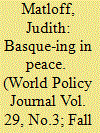

|
|
|
|
|
| Publication |
2012.
|
| Summary/Abstract |
Bilbao, Spain-Political violence was so rampant in the Basque Country in the mid 1980s that local journalists devised a proforma for the weekly bloodshed. Fill in the blank: policeman/soldier/ guard was killed/injured by a bomb/ bullet. The one constant was that the separatist guerrillas, Euskadi Ta Askata-suna, or Basque Homeland and Freedom (ETA), always claimed responsibility.
|
|
|
|
|
|
|
|
|
|
|
|
|
|
|
|
| 3 |
ID:
164149


|
|
|
|
|
| Summary/Abstract |
In May 2018, the Basque insurgent group Euskadi Ta Askatasuna (ETA) officially disbanded after a 60-year struggle. This inquiry assesses ETA’s violent campaigns using recent conceptual and theoretical advancements from the field of terrorism studies. Three conclusions concerning the group’s strategies of terrorism are advanced. First, ETA regularly targeted civilians to achieve goals other than coercing the Government of Spain; these objectives included outbidding rival separatist groups and spoiling negotiation processes. Second, ETA’s most rapid period of organizational growth occurred as the result of an aggressive terrorist campaign, demonstrating that civilian targeting can serve as a stimulus to rebel group recruitment. Finally, while terrorism did not advance ETA’s primary political objective of creating an independent Basque state, it did enable the group to assume a leading position within the radical Basque separatist movement, helping extend ETA’s lifespan and making the group an embedded actor within the contentious political processes surrounding the question of Basque self-determination. Collectively, these conclusions support recent theoretical findings arguing that non-state terrorism often enables insurgent groups to prolong their lifespans while paradoxically making it more difficult for them to advance their long-term political objectives.
|
|
|
|
|
|
|
|
|
|
|
|
|
|
|
|
| 4 |
ID:
109143
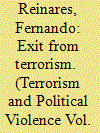

|
|
|
|
|
| Publication |
2011.
|
| Summary/Abstract |
Terrorists disengage from the groups or organizations to which they belong as a result of structural, organizational, or personal factors. These types of factors seem to operate with relative mutual independence. All this can be analytically induced from research conducted at an individual level of analysis, based on 35 long interviews with former members of ETA who voluntarily decided to conclude their militancy at some point between 1970 and 2000. Until the mid-1980s, the individual decision to leave ETA tended to be linked to a subjective perception of ongoing political and social changes. From then on, disagreement with the internal functioning of the ethno-nationalist terrorist organization or the tactics adopted by its leaders became more salient motivations for those militants who decided to walk away. All along, however, there were ETA members who left terrorism behind for reasons of a rather personal nature. As expected, in this qualitative empirical study, disengagement was found to be a process seldom concomitant to that of deradicalization.
|
|
|
|
|
|
|
|
|
|
|
|
|
|
|
|
| 5 |
ID:
086082


|
|
|
|
|
| Publication |
2009.
|
| Summary/Abstract |
Basque separatist group Euzkadi Ta Askatasuna (ETA) is at its weakest point since it was established in 1959. Nearly 800 ETA operatives are now behind bars following concerted government crackdowns in both Spain and France during 2007 and 2008. Although hopes that ETA will end its 50-year campaign of violence remain premature, the Spanish government has gained the upper hand and the group's room for manoeuvre is more limited than ever before.
Many of ETA's recent setbacks have been accompanied by internal disputes between hardliners favouring continued violence as a means of gaining Basque independence and pragmatists toying with the idea of negotiating a settlement with the central government in Madrid. Those internal disputes, in turn, have their roots in the March 2004 Madrid train bombings, carried out by Islamist extremists, which caused popular outrage against terrorism and made ETA's political violence increasingly untenable.
Image: A pro-independence supporter holds a portrait of ETA military leader, Garikoitz Aspiazu Rubina, detained
|
|
|
|
|
|
|
|
|
|
|
|
|
|
|
|
| 6 |
ID:
120321


|
|
|
|
|
| Publication |
2013.
|
| Summary/Abstract |
We deal in this article with the relationship between ETA attacks and electoral support for Batasuna, its political wing. We show that the relationship is twofold, since the geographical distribution of electoral support for the terrorists affects the location of ETA attacks, but violence also influences electoral support for the terrorist cause. On the one hand, when ETA chooses a location for its attacks, it takes into account the electoral strength of Batasuna. Our results show that the higher the vote for Batasuna in a municipality, the more likely members of the security forces will be killed there. With regard to the targeting of civilians, the relationship is curvilinear. ETA kills civilians in municipalities that are polarized, where support for Batasuna falls short of being hegemonic. On the other hand, our results also show that ETA attacks have an effect on the size of its support community. When ETA kills members of the security forces, voters punish the Batasuna party electorally. In the case of civilians, it depends on the specifics of the various campaigns. We find that when ETA kills informers and drug-dealers, the vote for Batasuna increases. ETA's killing of non-nationalist politicians, however, decreases Batasuna's vote share.
|
|
|
|
|
|
|
|
|
|
|
|
|
|
|
|
| 7 |
ID:
152865
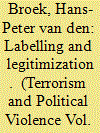

|
|
|
|
|
| Summary/Abstract |
This article focuses on the role of labelling in the discourse employed by the Left-Wing Nationalist movement in the Basque Country to legitimize the use of violence for political ends. The approach in this article goes beyond classic labelling theory. I demonstrate that radical Nationalists do not passively undergo their being labelled as deviants (fanatics, terrorists) by society, but develop counter-labels instead to define their opponents and re-label themselves.
|
|
|
|
|
|
|
|
|
|
|
|
|
|
|
|
| 8 |
ID:
159895
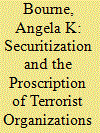

|
|
|
|
|
| Summary/Abstract |
This article applies securitization theory to account for the proscription of organizations linked to Euskadi Ta Askatasuna (ETA) in Spain. I argue that securitization is vital for understanding the evolution of Spanish counterterrorism policy from tolerating to banning political organisations not directly involved in terrorist attacks, but supporting and sympathetic to ETA. More specifically, I examine the role of the judiciary in the initiation of securitization processes in which ETA came to be conceived as a “complex structure” integrating armed and unarmed activists, and the resonance of judicial securitization frames in the public sphere. I do so by analysing evolving conceptions of the relationship between ETA and two organizations—the youth group Jarrai and its successors Haika and Segi and the ETA prisoners’ lobby Gestoras proAmnistía and its successor Alkatasuna—as articulated in court rulings and a sample of 573 newspaper articles published in the Spanish daily El País between 1994 and 2016. I argue that two modes of securitization can be observed in these cases, one extending security threats posed by ETA’s terrorist strategy to the political organizations and one framing both the terrorist group and political organizations as threats to the democratic community.
|
|
|
|
|
|
|
|
|
|
|
|
|
|
|
|
| 9 |
ID:
129030


|
|
|
| 10 |
ID:
121746


|
|
|
|
|
| Publication |
2013.
|
| Summary/Abstract |
This article aims to analyse the sources of terrorist financing of the Euskadi Ta Askatasuna (ETA). It takes into account the network of entities that, under the leadership and oversight of ETA, have developed the political, economic, cultural, support and propaganda agenda of their terrorist project. This study focuses, in particular, on the periods 1993-2002 and 2003-2010, to observe the changes in the financing of terrorism after the outlawing of Batasuna, ETA's political wing. The results show the significant role of public subsidies in finance the terrorist network. It also proves that the outlawing of Batasuna caused a major change in that funding.
|
|
|
|
|
|
|
|
|
|
|
|
|
|
|
|
| 11 |
ID:
156912
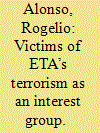

|
|
|
|
|
| Summary/Abstract |
This article responds to the following research questions: How and why have victims of ETA’s terrorism in Spain become an interest group with significant influence on the political and legislative agenda of the country. The evolution of the associative movement of victims of terrorism is assessed in order to explain the process by which their influence and impact on the political agenda has gradually grown throughout the years. It analyzes the transition from the isolation suffered by victims of terrorism in the early days of ETA’s campaign to the prominent social and political role played at later stages. The factors that motivate and explain their active role as interest groups are looked into, demonstrating different claims and interests with varying degrees of coherence and leverage. The relevancy of victims of terrorism within the anti-terrorist policies of various Spanish governments will be established, as well as the achievements and limitations of such a significant interest group.
|
|
|
|
|
|
|
|
|
|
|
|
|
|
|
|
| 12 |
ID:
152868


|
|
|
|
|
| Summary/Abstract |
This article analyzes the determinants of terrorism saliency in public opinion. It is usually assumed that after a terrorist attack, terrorism becomes automatically salient. However, this assumption is only true in those countries where terrorist attacks are exceptional events. In democracies that have suffered domestic terrorism for decades, the evolution of terrorism saliency does not only depend on the frequency or intensity of terrorist attacks. In this article it is claimed that the tactics carried out by terrorist groups (the type of victim, especially) and the dynamics of political competition (especially the ideology of the incumbent) are also factors that explain the evolution of terrorism saliency. The article also analyzes how these two factors interact with citizens’ predispositions to explain variation in their reactions to terrorist threat. The empirical test relies on a novel database from monthly public opinion surveys in Spain from 1993 to 2012.
|
|
|
|
|
|
|
|
|
|
|
|
|
|
|
|
| 13 |
ID:
147598


|
|
|
|
|
| Summary/Abstract |
This article responds to the following research question: what role have former Euskadi Ta Askatasuna (ETA) members played in counterterrorism and counterradicalization initiatives vis-à-vis the terror group in Spain? Our analysis of the role played by former ETA members so far demonstrates that only a minority of former ETA terrorists have disengaged from the terrorist organization and at the same time voiced some criticism of their past violent activities. Such a step, although a positive one, is part of a process that in most of the cases analyzed has to be deemed as incomplete due to deficits, some of them very significant, which considerably limit their effectiveness in countering terrorism and radicalization.
|
|
|
|
|
|
|
|
|
|
|
|
|
|
|
|
|
|
|
|
|